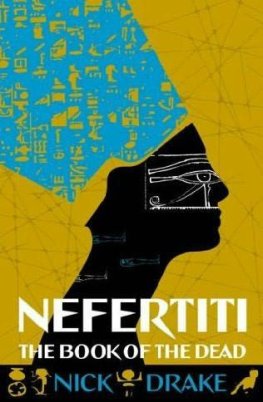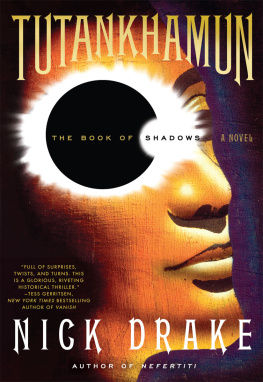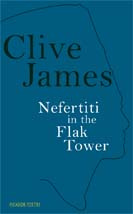Nick Drake - Nefertiti.he book of the dead
Here you can read online Nick Drake - Nefertiti.he book of the dead full text of the book (entire story) in english for free. Download pdf and epub, get meaning, cover and reviews about this ebook. genre: Adventure. Description of the work, (preface) as well as reviews are available. Best literature library LitArk.com created for fans of good reading and offers a wide selection of genres:
Romance novel
Science fiction
Adventure
Detective
Science
History
Home and family
Prose
Art
Politics
Computer
Non-fiction
Religion
Business
Children
Humor
Choose a favorite category and find really read worthwhile books. Enjoy immersion in the world of imagination, feel the emotions of the characters or learn something new for yourself, make an fascinating discovery.
- Book:Nefertiti.he book of the dead
- Author:
- Genre:
- Rating:4 / 5
- Favourites:Add to favourites
- Your mark:
- 80
- 1
- 2
- 3
- 4
- 5
Nefertiti.he book of the dead: summary, description and annotation
We offer to read an annotation, description, summary or preface (depends on what the author of the book "Nefertiti.he book of the dead" wrote himself). If you haven't found the necessary information about the book — write in the comments, we will try to find it.
Nefertiti.he book of the dead — read online for free the complete book (whole text) full work
Below is the text of the book, divided by pages. System saving the place of the last page read, allows you to conveniently read the book "Nefertiti.he book of the dead" online for free, without having to search again every time where you left off. Put a bookmark, and you can go to the page where you finished reading at any time.
Font size:
Interval:
Bookmark:
Nick Drake
Nefertiti.he book of the dead
O my heart which I had from my mother, O my heart which I had upon earth, do not rise upagainst me as witness in the presence of the Lord of Things
The Book of the DeadAUTHOR'S NOTE
Three and a half thousand years ago Akhenaten inherited an empire at the peak of its international power and wealth. It was a time of astonishing sophistication and beauty, but also of vanity and brutality. The Empire had a police force the Medjay and extensive papyrus archives to keep tabs on its citizens. The affluent worried about going grey, enjoyed their hunts and love affairs, and spent large amounts of money on their tombs in preparation for the afterlife. There were career bureaucracies and an enormous workforce, both local and immigrant. This complex society depended on the waters of the Nile that weaved like a great snake through the desert, dividing the Egyptian world into the fertile Black Land and the barren Red.
Akhenaten chose to do something extraordinary with his riches. He and his Great Royal Wife, Nefertiti 'the Perfect One' initiated a period of revolution in religion, politics and art. Rejecting and abolishing Egypt's traditional institutions and gods, and challenging the powerful priesthoods, they built an extraordinary new city, Akhetaten, as a centre for the celebration of their new faith. At the heart of this was the worship of the Aten, now the only god, represented by the disc of the Sun.
Today little remains of the city. Outside the modern Amarna you can trace the line of the Royal Road, and the palaces and Aten Temples. You can visit the cliff tombs of the great men who worked for Akhenaten and Nefertiti: Mahu, the chief of police, Meryra, the High Priest, Parennefer, the architect of the Amarna style, and Ay, 'God's father' and influential adviser to the King. You can descend the many steps into Akhenaten's empty burial chambers.
But you cannot visit Nefertiti's tomb, for she, the most powerful and charismatic woman of the ancient world, mysteriously vanished in year 12 of Akhenaten's seventeen-year reign. Why she vanished when she did, and what happened to her, is the mystery this story explores.
1
Year 12 of the Reign of King Akhenaten, Glory of the Sun Disc. Thebes, Egypt
I had dreamed of snow. I was lost in a dark place, and snow was falling slowly and silently, each flake a puzzle I could never solve before it disappeared. I awoke with the feeling of its fleeting, cryptic lightness on my face. It made me feel surprisingly sad, as if I had lost something, or someone, for ever.
I lay still for a moment, listening to Tanefert breathing quietly at my side, the heat of the day already rising. I have never seen snow, of course, but I remember reading the report of a box of it carried from the furthest north, like treasure, packed in straw. And one hears the stories brought back from beyond the horizon. A freezing world. Deserts of snow. Rivers of ice. White and weightless, it may be held in the hand if one can endure the pain of its cold fire. Yet it is nothing but water. Water, which cannot be held in the hand. Only its incarnation has been changed, and I believe it changes back again depending on the world in which it finds itself. I also heard that when they finally opened the box, it was empty. This mysterious snow had vanished. Someone no doubt died for the disappointment. Such is treasure.
Maybe this is also death. That is not what we hear from the Priests. We all learned the prayer: 'when the tomb is opened may the body be perfect for the perfect life after life'. But have they seen the heat of the sun god rot and putrefy the charming flesh of the living, the young and the beautiful, with their nonsensical hopes and point-less dreams, into the contorted shapes of horror and monstrosity and petrified agony? Have they seen lovely faces cut apart, holes ripped open through muscle, heads smashed to bony fragments, the strange puckering of burned flesh where the fat has boiled? I doubt it.
Such thoughts are the torment of my work. I, Rahotep, youngest chief detective of the Thebes Medjay division, see my children playing or struggling to concentrate on their musical instruments. And I know their skin, which we caress and kiss, and care for with almond and moringa oils, and perfume with persea and myrrh, and dress with linens and gold, is merely a bag containing organs and bones and jars of blood; the hopes of being alive and in love depend on this butcher's business. I keep this to myself, even when I make love to my wife and for an instant her elegant body as it turns to me by the light of the oil lamp blurs from perfection into death. Apparently this is a rather famous thought. I should be grateful, perhaps, to have such thoughts. I should be more poetic, more philosophical, more often, if only to amuse during my private hours. Well, I have no private hours. And then again, as I stand over yet another corpse, a life a little history of love and time ended in a moment of frenzy or hatred or madness or panic, I feel it is the only time I know where in the world I am.
Of course, as Tanefert says whenever she finds the opportunity -which these days is too often it is typical of me to think the worst of any given situation. But in these impossible times of the reign of Akhenaten I am confronted daily with justifications for this attitude. Things grow worse. I see it in my work: in the ever-increasing numbers of tormented and mutilated bodies of murder victims, and in the robbed and desecrated tombs of the rich and powerful, with the Nubian security guards grinning from ear to ear through their slit throats. I see it in the ostentation of the rich and the endless misery of the poor. I see it in the greater world in the shaking news of the Great Changes: the King's banishment of the Karnak Temple Priesthood from their ancient places and rights; the denial and sometimes the desecration of Amun and all the lesser, older, popular gods; the imposition of the strange new god we are now supposed to celebrate and worship. I see it in the eccentric conception and extravagant expense of the mysterious new temple city of Akhetaten, under construction these last years in the desert, midway between here and Memphis and therefore so deliberately far from everyone. And I see all this imposed upon a perilous economy at a time of turbulence and uncertainty in our Empire. So, indeed, how else should I think? She says it is not normal, and she is right. But I passed through that portal long ago, when I understood that shadows and darkness live inside each one of us, and how little it takes before they leach through the soul and the smile. Death is easy.
So when I returned home at noon with the news of my sudden calling to investigate a great mystery at the heart of the regime stuck alarmingly in my mind, Tanefert took one look at me and said, 'What has happened? Tell me.' She sat down on the bench in the front room, where we never sit. I reached out to her, but she knows this ploy. 'I don't need you to hold my hand. I've been through this before.'
So I told her. About Ahmose coming into my office that morning. He was relishing a pastry, as always, not noticing the crumbs that fell clumsily into the ample folds of his robe. His belly makes him slow, and a detective should be strong but trim (as I think my daily exercises have made me). About how, with his usual sullen manner, he communicated with more than usual reluctance and aggression the arrival of the command from on high ordering me immediately and without delay to Akhetaten, to attend the court of Akhenaten in pursuit of a great mystery. We stared at each other. 'Why has this honour fallen to me?' I asked. Ahmose shrugged, and then smiled like a yawning necropolis cat. 'That's your job to find out.' 'And what is the mystery?'
Font size:
Interval:
Bookmark:
Similar books «Nefertiti.he book of the dead»
Look at similar books to Nefertiti.he book of the dead. We have selected literature similar in name and meaning in the hope of providing readers with more options to find new, interesting, not yet read works.
Discussion, reviews of the book Nefertiti.he book of the dead and just readers' own opinions. Leave your comments, write what you think about the work, its meaning or the main characters. Specify what exactly you liked and what you didn't like, and why you think so.








